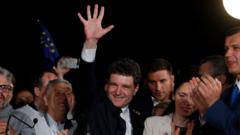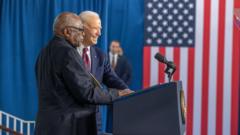As Romania embraces Nicusor Dan's leadership, voters express a desire for stability over extremism, navigating through national divides while aiming for stronger ties with Europe.
Romania's New Leadership: Nicusor Dan Elected Amidst National Divisions

Romania's New Leadership: Nicusor Dan Elected Amidst National Divisions
The election of mathematician Nicusor Dan as Romania's president marks a significant shift in the nation’s political landscape, characterized by fear of radical change and defiance against Russia.
Nicusor Dan's election marks a pivotal moment for Romania as the nation grapples with deep political divisions and the shadow of nationalism. Following his victory in the presidential elections, the mathematician and former mayor of Bucharest has positioned himself as a symbol of change against the longstanding political establishment.
On Monday, the day after his election, Dan, affectionately known as Nicky, maintained a normal routine by picking up his daughter from school, promising his family life would remain unchanged. However, the political atmosphere in Romania has undergone a dramatic shift, with voters predominantly seeking change from traditional governance that has persisted for over three decades.
Dan's opponent, George Simion, represents a hard-right nationalist viewpoint and was previously banned from entering two neighboring countries due to his inflammatory claims regarding territorial integrity. While Simion garnered 41% of the votes initially, Dan managed to rally support in the second round. Political analyst Radu Magdin attributed this change to an increase in voter turnout driven by a middle-class fear of regression if Simion were to assume power.
Despite Simion's fervent support from various factions, including traditionalists and those disillusioned by governmental corruption, Dan's candidacy offered a more moderate alternative. Many voters remembered the aggressive tactics and controversial statements made by Simion during the campaign, which ultimately swayed public sentiment towards Dan.
In addition to the internal political dynamics, voters viewed Dan's win as a stance against Russian interference, referencing past election meddling intended to bolster extremist candidates. Celebrations erupted following the election, underscored by chants affirming Romania's independence from Moscow's influence.
Dan's electoral success also represents a collective desire for a future anchored in European values and cooperation. Many young Romanians expressed a commitment to remain aligned with European norms, fearing a drift away from these ideals under Simion’s leadership. Consequently, Dan's promise to enhance Romania’s ties with the European Union resonated strongly among voters looking for security and progress.
While Dan's victory was significant, it underscores the persistent divide within the Romanian electorate, revealing a landscape where millions hold contrasting views. As he steps into the presidency, the expectations for transformative change are immense. However, analysts cautioned that Romania's political landscape is fraught with challenges, emphasizing that the future may see rising nationalist sentiments if mainstream politicians fail to meet voter demands for effective governance and progress.





















